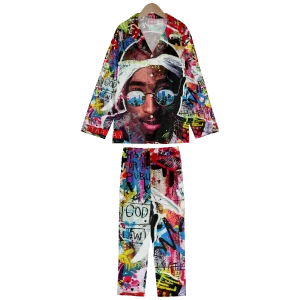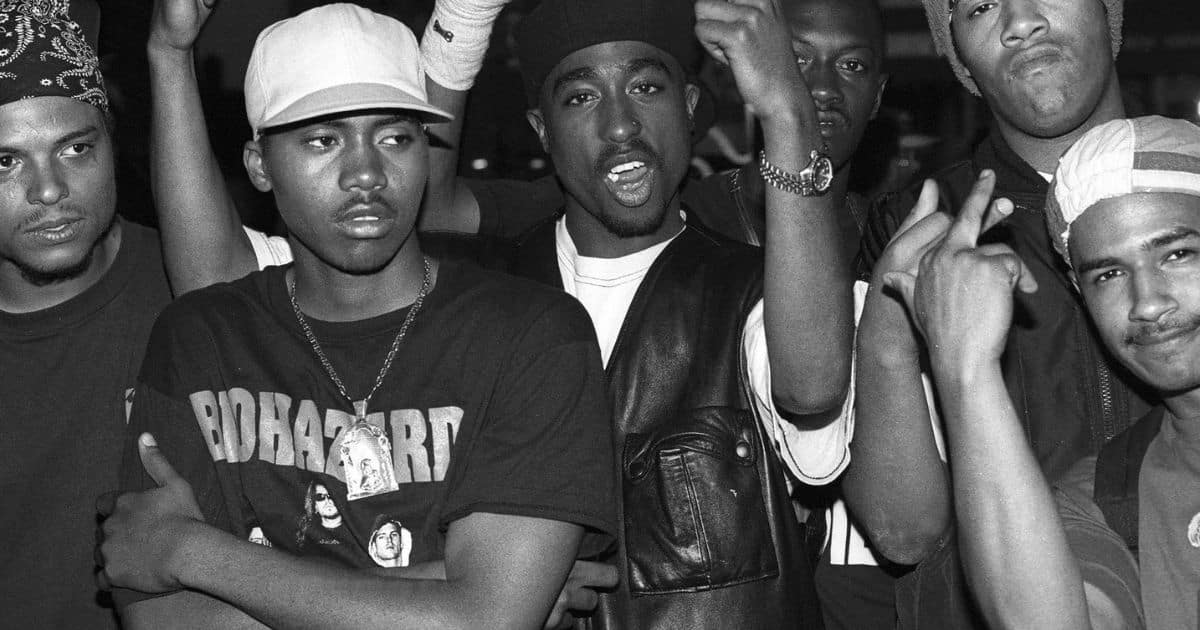Tupac Shakur is a name that will forever be ingrained in the history of Hip-Hop. Born in East Harlem, New York, in 1971, Tupac had a difficult childhood, surrounded by poverty and violence. Despite the odds, he rose to fame as a rapper, actor, and activist, leaving an indelible mark on the music industry that still resonates today. In this article, we will delve into Tupac’s legacy and explore how he redefined Hip-Hop culture, inspiring generations of artists to come.

Tupac Clothing & Merchandise
Show your respect for one of the greatest legends in hip-hop: 2Pac. Get ready to step up your style game with a stunning range of Tupac Amaru Shakur merchandise, from vintage t-shirts and baseball jerseys to unique bomber jackets! Don’t miss this opportunity – honor his legacy by sporting some must-have Makaveli apparel at unbeatable prices. Hustle those streets like Pac and look the hottest in town – grab yours now!
Tupac’s Early Life and Career
Tupac’s early life was characterized by poverty and instability. His mother, Afeni Shakur, was a member of the Black Panther Party and was imprisoned while pregnant with Tupac. After her release, she struggled to provide for her family, and Tupac often found himself moving from place to place. Despite these challenges, Tupac found solace in music, and at the age of 17, he moved to Marin City, California, where he began his music career.
Tupac’s early music was heavily influenced by the East Coast Hip-Hop scene, and he quickly gained a reputation as a skilled rapper. In 1991, he signed with Interscope Records, and his debut album, “2Pacalypse Now,” was released the following year. The album tackled themes of police brutality, racism, and social injustice, and it immediately cemented Tupac’s reputation as a voice of the people.
Tupac’s Unique Style and Message
Tupac’s music was more than just catchy beats and clever rhymes. He used his platform to speak out against the injustices faced by the Black community, and his lyrics were raw, emotional, and unapologetic. Tupac’s unique style and message set him apart from other rappers of his time, and he quickly became a cultural icon.
One of Tupac’s signature techniques was his use of storytelling. He was a master of weaving intricate narratives into his lyrics, creating vivid imagery that transported listeners into his world. Tupac’s songs were often deeply personal, and he drew on his own experiences to craft his music. He tackled themes of love, loss, and hope, but he also delved into darker subjects, such as drug addiction and gang violence.
Tupac’s Impact on Hip-Hop Culture
Tupac’s impact on Hip-Hop culture cannot be overstated. He redefined the genre with his unique style and message, and he inspired a generation of artists to use their music as a platform for social change. Tupac’s music was a reflection of the struggles faced by the Black community, and his lyrics spoke to the disenfranchisement and marginalization that many people experienced.
Tupac’s influence extended beyond the music industry. He was a vocal advocate for social justice, and he used his platform to speak out against racism, police brutality, and other forms of oppression. Tupac’s activism inspired others to get involved in the fight for justice, and his impact can still be felt today.
Tupac’s Influence on Future Artists
Tupac’s influence on future artists is undeniable. He inspired a generation of rappers to use their music as a tool for social change, and his legacy can be seen in the work of artists such as Kendrick Lamar, J. Cole, and Chance the Rapper. Tupac’s unique style and message continue to resonate with audiences, and his music remains a source of inspiration for many.
Tupac’s impact can also be seen in the way that Hip-Hop has evolved over the years. He was a pioneer of the genre, and his influence can be felt in the work of artists across multiple sub-genres of Hip-Hop. Tupac’s legacy is a testament to the power of music to effect change and inspire others.
Tupac’s Controversial Legacy
Tupac’s legacy is not without controversy. His music often depicted violence and misogyny, and he was involved in several high-profile feuds with other rappers. Tupac’s legal troubles also cast a shadow over his legacy, and he spent time in jail on multiple occasions.
Despite these controversies, Tupac’s impact on Hip-Hop culture remains undeniable. He used his music to speak out against social injustice, and he inspired others to do the same. Tupac’s legacy is a reminder that artists are complex individuals who can have a profound impact on the world around them.
The Continuing Relevance of Tupac’s Music
Tupac’s music remains relevant today, over two decades after his death. His lyrics still speak to the struggles faced by the Black community, and his message of social justice is just as important now as it was when he was alive. Tupac’s music has also been embraced by new generations of fans, who continue to be inspired by his unique style and message.
Tupac’s music has also remained relevant through its use in popular culture. His songs have been featured in numerous films, TV shows, and video games, and his image has been immortalized in countless pieces of art. Tupac’s impact on popular culture is a testament to the enduring power of his music.
Tupac’s Posthumous Releases and Impact
Tupac’s impact on Hip-Hop culture has continued even after his death. In the years since he passed away, several posthumous albums featuring previously unreleased material have been released. These albums have been met with both praise and criticism, with some fans arguing that they dilute Tupac’s legacy.
Despite this controversy, Tupac’s posthumous releases have continued to be popular with fans, and they have helped to keep his legacy alive. Tupac’s impact on Hip-Hop culture can still be felt through his music, and his message of social justice continues to inspire new generations of artists.
Celebrating Tupac’s Life and Legacy
Tupac’s life and legacy continue to be celebrated by fans all over the world. Each year, on the anniversary of his death, fans gather to pay tribute to the legendary rapper. Tupac’s music remains a source of inspiration and comfort for many, and his impact on Hip-Hop culture will never be forgotten.
Tupac’s legacy is a reminder of the power of music to effect change and inspire others. He used his platform to speak out against social injustice, and his unique style and message continue to resonate with audiences today. Tupac may be gone, but his legacy lives on, inspiring new generations of artists to use their music as a tool for social change.
-
 Cool Tupac Shakur Timberland Design Zip Up Hoodie
Cool Tupac Shakur Timberland Design Zip Up Hoodie -
 Tupac Makaveli Shakur Iconic Timberland Hoodie
Tupac Makaveli Shakur Iconic Timberland Hoodie -
 Hip Hop Gangsta Rapper 2Pac Amaru Shakur LA Dope Baseball Jersey
Hip Hop Gangsta Rapper 2Pac Amaru Shakur LA Dope Baseball Jersey -
 Rap Icon Tupac Multicolor Graffiti Art Pyjamas Set
Rap Icon Tupac Multicolor Graffiti Art Pyjamas Set -
 Timberland Logo Tupac Amaru Shakur Dope Varsity Jacket
Timberland Logo Tupac Amaru Shakur Dope Varsity Jacket -
 Dope 2Pac Shakur Portrait Notorious Black Pajamas Set
Dope 2Pac Shakur Portrait Notorious Black Pajamas Set -
 2pac Shakur Only God Can Judge Me West Side Dope Bedding Set
2pac Shakur Only God Can Judge Me West Side Dope Bedding Set -
 2Pac Shakur White on Blue West Coast Hip Hop Baseball Jersey
2Pac Shakur White on Blue West Coast Hip Hop Baseball Jersey -
 Juice Bishop Power & Respect 2Pac Graphic Tee
Juice Bishop Power & Respect 2Pac Graphic Tee
Conclusion
Tupac Shakur was a cultural icon whose impact on Hip-Hop culture cannot be overstated. He redefined the genre with his unique style and message, and he inspired a generation of artists to use their music as a platform for social change. Tupac’s legacy is a testament to the power of music to effect change and inspire others. Despite his controversial legacy, Tupac’s music remains relevant today and continues to inspire new generations of fans. Tupac may be gone, but his legacy lives on, reminding us of the importance of using our voices to fight for justice and equality.

